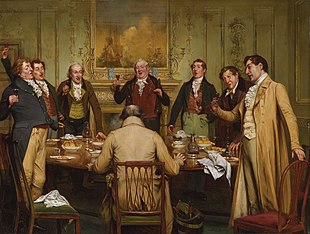| "For He's a Jolly Good Fellow" | |
|---|---|
| Song | |
| Genre | popular song |

Problems playing this file? See media help.
"For He's a Jolly Good Fellow" is a popular song that is sung to congratulate a person on a significant event, such as a promotion, a birthday, a wedding (or playing a major part in a wedding), a retirement, a wedding anniversary, the birth of a child, or the winning of a championship sporting event. The melody originates from the French song "Malbrough s'en va-t-en guerre" ("Marlborough Has Left for the War").
History
The tune is of French origin and dates at least from the 18th century. Allegedly it was composed the night after the Battle of Malplaquet in 1709. It became a French folk tune and was popularised by Marie Antoinette after she heard one of her maids singing it. The melody became so popular in France that it was used to represent the French defeat in Beethoven's composition Wellington's Victory, Op. 91, written in 1813.
The melody also became widely popular in the United Kingdom. By the mid-19th century it was being sung with the words "For he's a jolly good fellow", often at all-male social gatherings, and "For she's a jolly good fellow", often at all-female social gatherings. By 1862, it was already familiar in the United States.
The British and the American versions of the lyrics differ. "And so say all of us" is typically British, while "which nobody can deny" is regarded as the American version, but the latter has been used by non-American writers, including Charles Dickens in Household Words, Hugh Stowell Brown in Lectures to the Men of Liverpool and James Joyce in Finnegans Wake. (In the short story "The Dead" from Dubliners, Joyce has a version that goes, "For they are jolly gay fellows..." with a refrain between verses of "Unless he tells a lie".) The 1935 American film Ruggles of Red Gap, set in rural Washington State, ends with repeated choruses of the song, with the two variations sung alternately.
Text
As with many songs that use gender-specific pronouns, the song can be altered to match with the gender of the intended recipient. If the song is being sung to two or more people, it is altered to use plurals.
British version

For he's a jolly good fellow, for he's a jolly good fellow
For he's a jolly good fellow, and so say all of us!
American version
For he's a jolly good fellow, for he's a jolly good fellow
For he's a jolly good fellow, which nobody can deny!
Melody

See also
References
- The Oxford Dictionary of Music, 2nd. ed. (revised). Ed. Michael Kennedy: "18th‐cent. Fr. nursery song. ... It is usually stated that 'Malbrouck' refers to the 1st Duke of Marlborough, but the name is found in medieval literature."
- Catalogue of rare books of and relating to music. London: Ellis. 1728. p. 32.
- West, Nancy Shohet (9 June 2011). "Mining nuggets of music history". The Boston Globe. Retrieved 22 June 2011.
- ^ Cryer, Max (2010). Love Me Tender: The Stories Behind the World's Favourite Songs. Exile Publishing. pp. 26 ff. ISBN 978-1-4587-7956-4.
- The Times (London, England), 28 March 1826, p. 2: "The Power of Music: A visiting foreigner, trying to recall the address of his lodgings in Marlborough Street, hums the tune to a London cabman: he immediately recognises it as 'Malbrook'".
- The song may have featured in an "extravaganza" given at the Princess Theatre in London at Easter 1846, during which fairies hold a moonlight meeting: "...the meeting closes with a song of thanks to Robin Goodfellow (Miss Marshall), who had occupied the chair, ...and who is assured that 'he's a jolly good fellow'." "Princess's." The Times (London, England) 14 April 1846: 5. The Times Digital Archive. Web. 1 October 2012.
- The Times reprinted an article from Punch describing a drunken speech given at a (fictional) public meeting. The speech ends: "Zshenl'men, here's all your vehgood healts! I beggapard'n – here's my honangal'n fren's shjolly goo' health! 'For he's a jolly good fellow', &c (Chorus by the whole of the company, amid which the right hon. orator tumbled down.)" "The After Dinner Speech at the Improvement Club". The Times, (London, England) 23 March 1854: 10. The Times Digital Archive. Web. 1 October 2012.
- Review of a piano recital: "As a finale he performed for the first time, a burlesque on the French air, 'Marlbrook', better known to the American student of harmony as 'He's a jolly good fellow'." The New York Times, 4 October 1862
- An 1859 version quoted in The Times, however, has some "red-faced" English officers at an Indian entertainment dancing before their host: "...declaring that he was 'a right good fellow; he's a jolly good fellow, which nobody dare deny hip, hip, hip, hoorah!' &c." The Times (London, England), 24 March 1859, p. 9
- Dickens, Charles (1857). Household Words. Vol. 15. p. 142.
- Brown, Hugh Stowell (1860). Lectures to the Men of Liverpool. p. 73.
- Joyce, James (2006). Finnegans Wake. JHU Press. p. 569. ISBN 9780801883828.
- Originally the song was associated with after-dinner drinking by all-male groups and not used for females. In 1856, British officers in the Crimea mistakenly sang it after a toast had been made, in Russian, to the Empress of Russia: "...peals of laughter followed when they all learned the subject of the toast, which was afterwards drunk again with due honour and respect." Blackwood's Magazine, vol. 80, October 1856